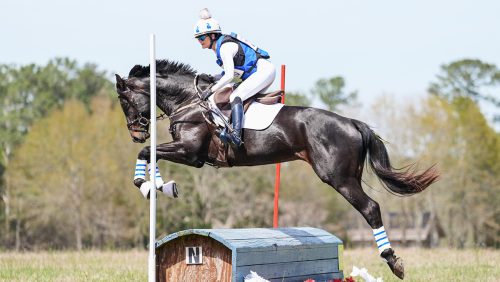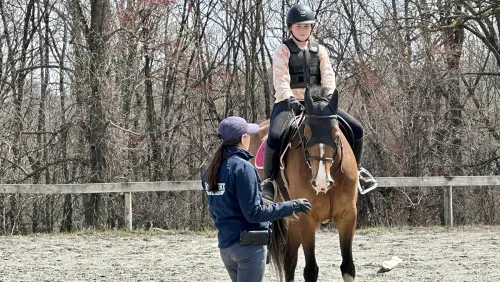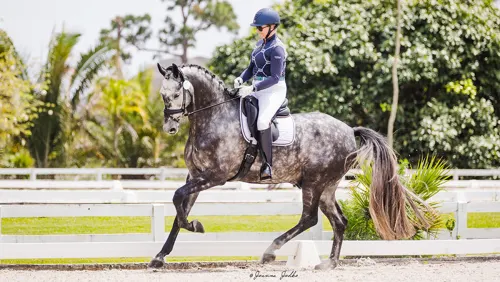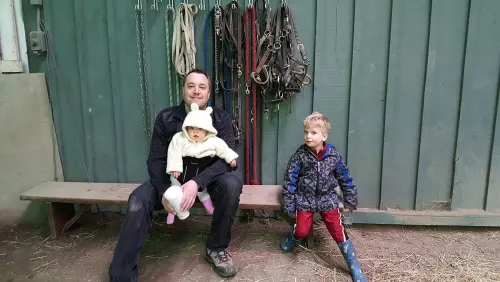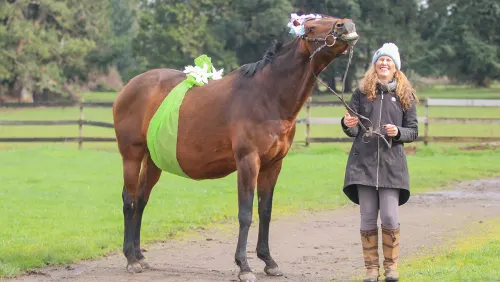“We have one basic rule: You can’t quit trying,” Kathy Baar said, verbalizing to us what she was communicating to the horse in front of her. “You can be wrong; it can be hard; that’s fine. But you cannot quit trying.”
The ever-patient and calm horsewoman was working in the soft shade of our round pen while a few of us leaned against the cool metal rail with coffee or notepads in hand, hoping to capture her dance with this particularly haunted Thoroughbred.
I have watched Kathy work with a lot of horses and people, varying from incompetent and incorrigible to magnificent and magical. She brings quiet knowledge and unemotional confidence to her teaching, calmly but firmly imparting her core beliefs.
The horse in our round pen horse wore its emotions on its sleeve while Kathy asked a few simple, empathetic housekeeping questions. It was responding in stride until, without sufficient reason, it opted to “exit the interview.” This was the first time I saw Kathy hit the place of Firm on her beliefs. I watched her work rhythmically, with timing, strength and balance while saying out loud, “One … basic … rule: … You … can’t…. quit… trying…”
I’ve thought about her words often, and how they complement other wise advice I’ve heard.
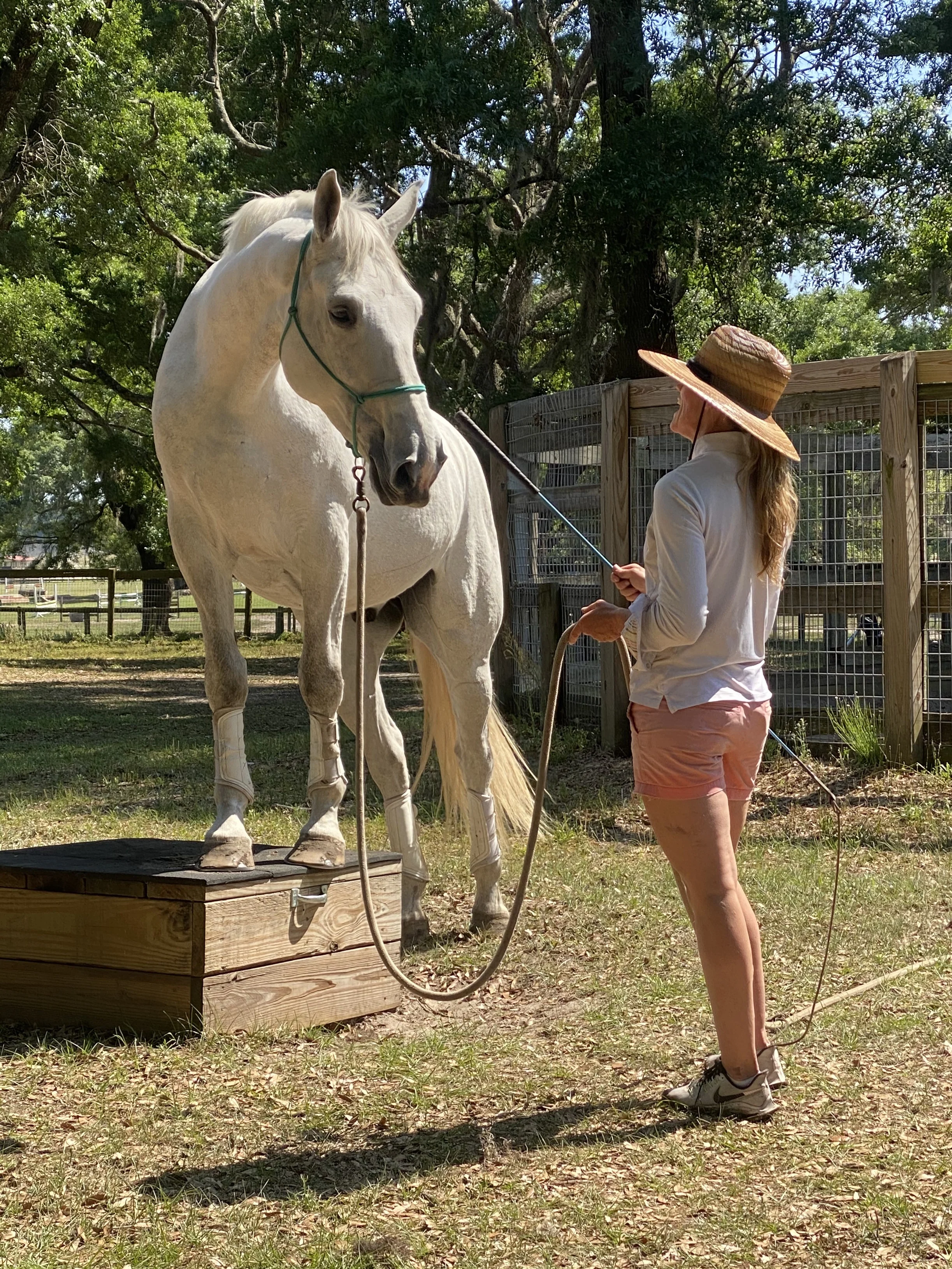
Halpin played games to engage the brain and body of Riordan, a 5-year-old Irish Sport Horse bred by her mother, Bernadette Cogdell, during a recent clinic with Kathy Baar. Photos Courtesy Of Sinead Halpin
I love Elizabeth Gilbert’s TED talk in which she differentiates between having a genius rather than being a genius. She references the Romans and how they believed creativity didn’t come from humans but from a sort of divine spirit labeled a “genius.” What a relief! If you perform poorly, it’s not you but your genius having a bad day; if it’s going well, your ego needn’t inflate over that, either. Her point was that she kept showing up to write and create, with the idea that eventually her genius would, too, and then she wrote her bestseller “Eat, Pray, Love.”
I love this detached view of success and failure because, in the past, I have often measured myself by an inaccurate scale of balance and have found myself on one foot trying to juggle. Surely we are not a culmination of our successes and failures, but we are the stuff in between, “the pause between words,” as the saying goes.
Bringing all this back to the real world instead of New Earth: this ego thing.
ADVERTISEMENT
For some reason, this year I decided to delve into some skill sets that I felt capable of upgrading. This meant committing to stepping back from competition and stepping into some really uncomfortable, honest mirror time—and not in the selfie way.
I went to Red Hills Horse Trials in March to support my husband Tik Maynard and brought our son along. I ran into David O’Connor, and while we were chatting, he looked a little uncomfortable and asked if I was OK.
I wasn’t totally sure if I knew how to answer.
Should I say, “At this moment, I am dying that I’m not competing, that I am not in contention for something? Anything?” Should I admit I miss being on the rollercoaster of self-inflicted expectation and reality?
Instead, I simply said, “Well, I’m just kind of taking a second,” to which he responded, “A walk-about, I get it.” And I think he did.
I have had a few a-ha moments in my walk-about. I’ll list them in no particular order:
- Learn how you learn: Empowering yourself as a student, without judging yourself, and building awareness of your environment is so important. Where do you need to be in your head and energy to learn with full awareness, focus and the appropriate amount of vulnerability? If you can find this space, you can be in tricky situations and be emotionally safe while still learning and growing.
- Unwanted behavior comes from anxiety: Figuring out what is causing the anxiety is more than half the battle. This seems true for horses, students and relationships.
- Focus vs. distraction: Thoughts are just thoughts until you label them as “good” or “bad.” They can become incredibly distracting at exactly the wrong time if you let them. At a certain point, you have to quiet the mind and trust the body to do what it knows how to do.
- Horses read the intention behind the “ask:” Align the landscape of your question and the picture in your head. Otherwise, it can get quite confusing for all parties involved. Ask wholeheartedly for what you want and then pay attention to the response.
- “We do not rise to the occasion; we fall to our level of preparation:” Always be ready for opportunity, or else someone else will be.
- Every horse you meet in your life is there for a reason: Do not miss the reason, the lesson that horse is there to teach you, or you will keep being presented with the same lesson. (Think about this when you find yourself saying, “Somehow, I always end up with …”)
I was reading my son “Thomas the Tank Engine,” and there was a part where Thomas has to find his own track, alone. My son and I were empathetically watching the illustration on the page while the familiar text of the book rolled off my tongue. I knew the conclusion of the story, but still I found my heart like my baby’s, worried about Thomas alone on his track. Then I found balance and rhythm is in the sound of a steam engine saying, “I think I can, I think I can.” It sounds strikingly similar to “You … Can’t … Quit … Trying …”








